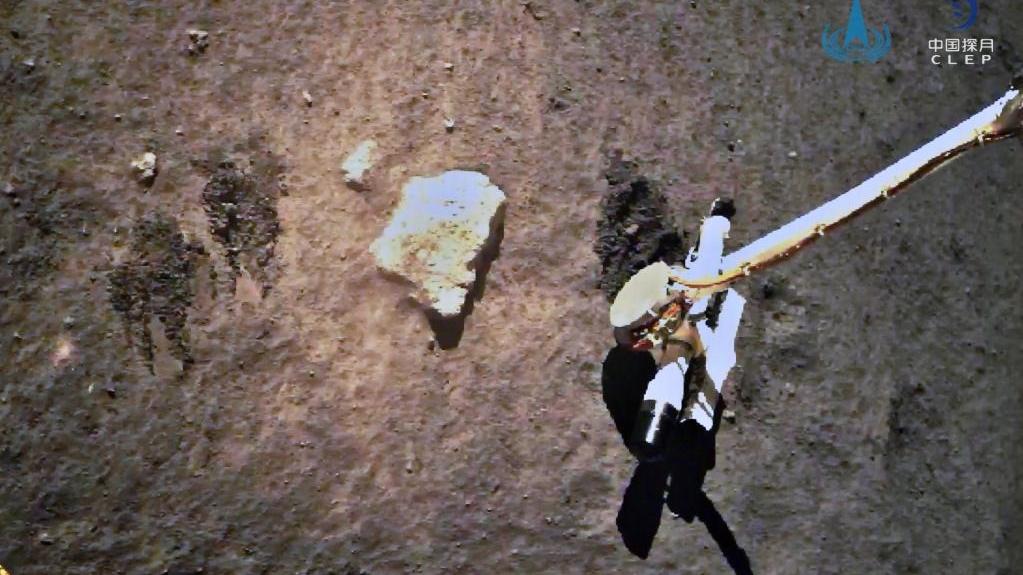 This file photo provided by the China National Space Administration shows Chang'e 5 probe gathering samples on the moon on Dec 2, 2020. (PHOTO / XINHUA)
This file photo provided by the China National Space Administration shows Chang'e 5 probe gathering samples on the moon on Dec 2, 2020. (PHOTO / XINHUA)
JIUQUAN - China plans to realize manned lunar landing by 2030, announced the China Manned Space Agency (CMSA) at a press conference Monday.
Lin Xiqiang, deputy director of the CMSA, said at the conference that China has recently initiated the lunar landing phase of its manned lunar exploration program.
The overall goal is to achieve China's first manned landing on the moon by 2030 and carry out lunar scientific exploration and related technological experiments, he added.
China's manned lunar landing will promote the leapfrog development of manned space technology from near-Earth to deep space, deepen human understanding of the origin and evolution of the moon and the solar system, and contribute Chinese wisdom to the development of lunar science, said Lin Xiqiang, deputy director of the CMSA
According to Lin, the goal also includes mastering the key technologies such as Earth-moon manned roundtrip, lunar surface short-term stay, human-robot joint exploration, accomplishing multiple tasks of landing, roving, sampling, researching, returning, and forming an independent capability of manned lunar exploration.
China's manned lunar landing will promote the leapfrog development of manned space technology from near-Earth to deep space, deepen human understanding of the origin and evolution of the moon and the solar system, and contribute Chinese wisdom to the development of lunar science, he said.
The CMSA has carried out various research and development work to achieve the goal on the basis of preliminary key technology research and program demonstration, including the research and development of the new-generation manned launch vehicle Long March-10, new-generation manned spaceship, lunar lander and lunar landing suits, as well as the building and testing of a new launch site, facilities and equipment.
ALSO READ: Construction plan unveiled for global lunar research station
Manned lunar rover
Also on Monday, the CMSA released an announcement to solicit proposals for the country's first manned lunar rover, which will be driven by two astronauts.
The current mission design indicates that the manned lunar rover will have functions such as manned driving and riding, lunar surface movement, positioning support and safety assistance, which can help astronauts in terms of movement, communication, exploration and so on, it said.
To pool high-quality resources from the whole society, explore a suitable commercial development mode and improve efficiency, the CMSA solicits proposals from the public and will select the best teams to develop the rover prototype, it added.
The current mission design of the country's first manned lunar rover indicates that the rover will have functions such as manned driving and riding, lunar surface movement, positioning support and safety assistance, which can help astronauts in terms of movement, communication, exploration and so on, the CMSA said
The proposals should include task requirement demonstration, overall scheme design, main key technologies, safety and reliability design, the development process, quality and schedule guarantees, a business model, and funding request.
Selection of new taikonauts
Meanwhile, the selection of the fourth batch of taikonauts, China's new generation of astronauts, is proceeding as planned and will be completed by the end of this year, the CMSA's Lin said at the same press conference.
The selection process was launched in 2022 and will result in 12 to 14 reserve taikonauts being picked, each with different specialisms, such as spacecraft pilots, flight engineers and payload specialists, he said.
"For the first time, the post of payload specialist is open to people from Hong Kong and Macao," Lin noted.
By March 2023, the first stage of the selection process had been completed, and more than 100 candidates then entered the second round, including more than 10 from the two special administrative regions.
READ MORE: HK selects 40 payload specialist candidates in initial screening
According to Lin, candidates for the space pilot role are selected from among active military pilots, while flight engineers and payload experts are taken from industrial sectors as well as colleges and universities.


